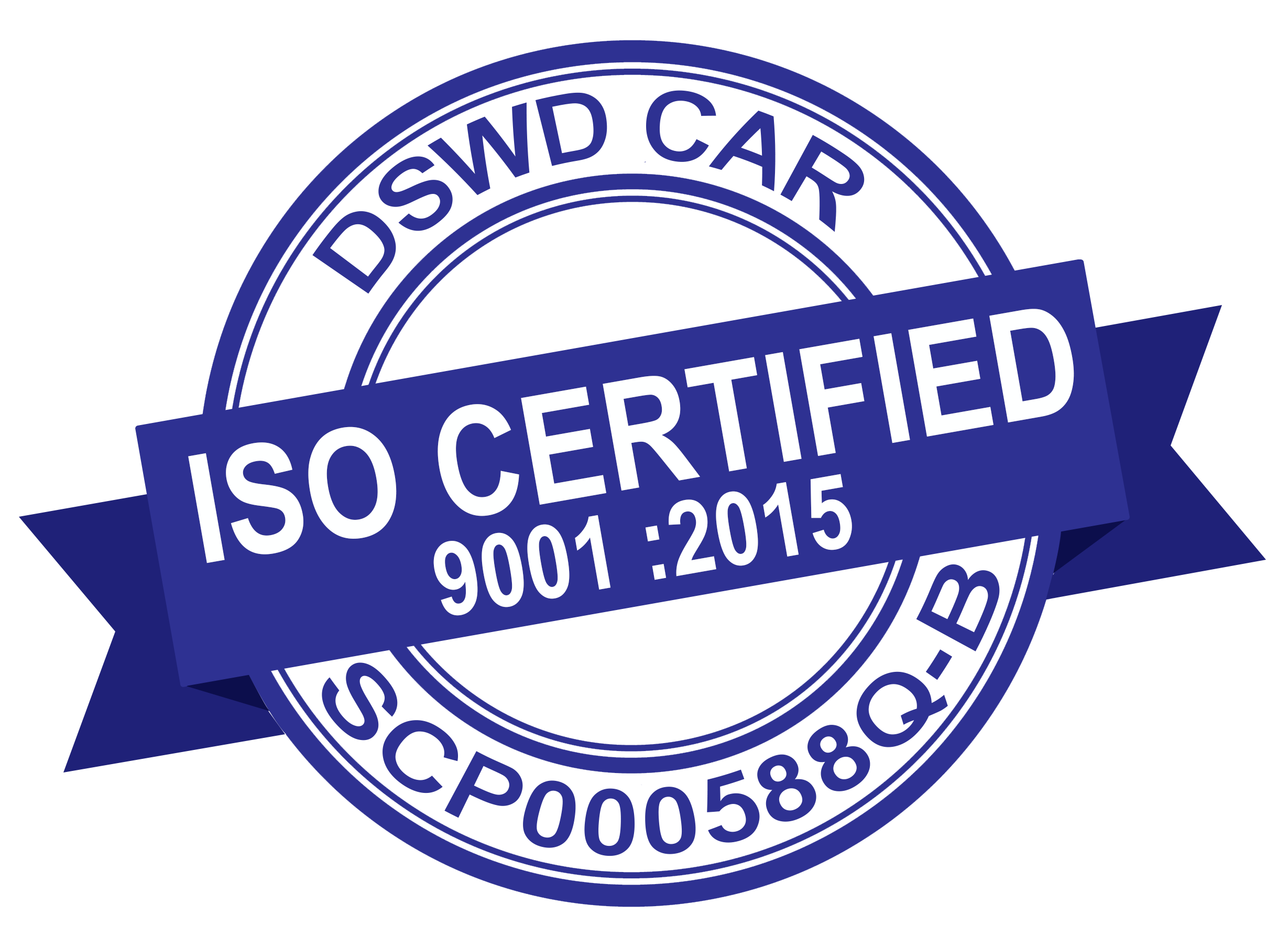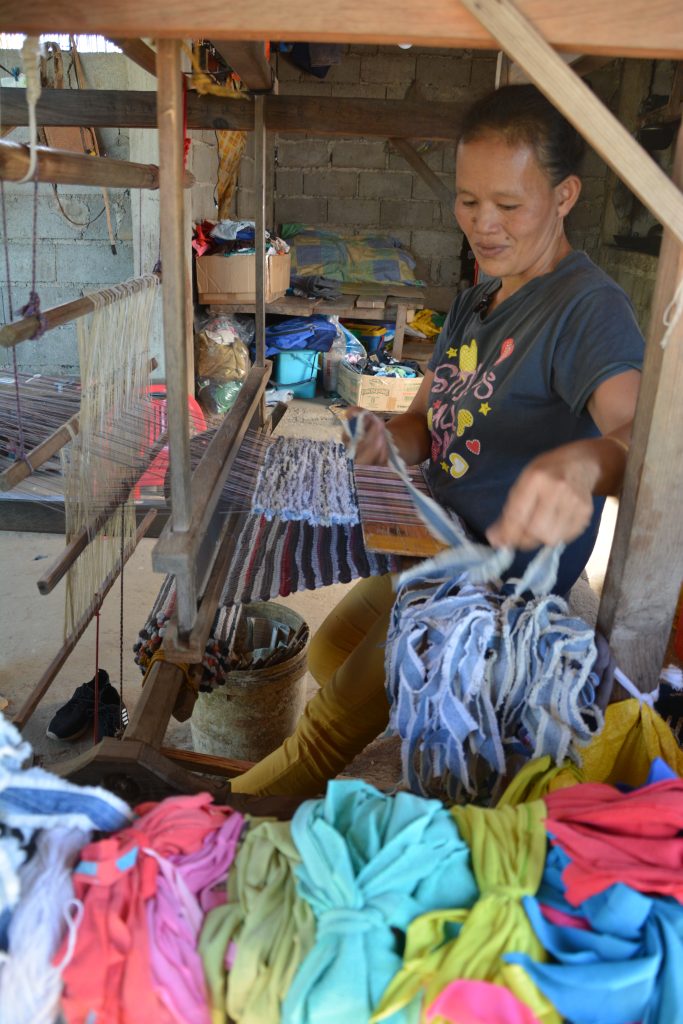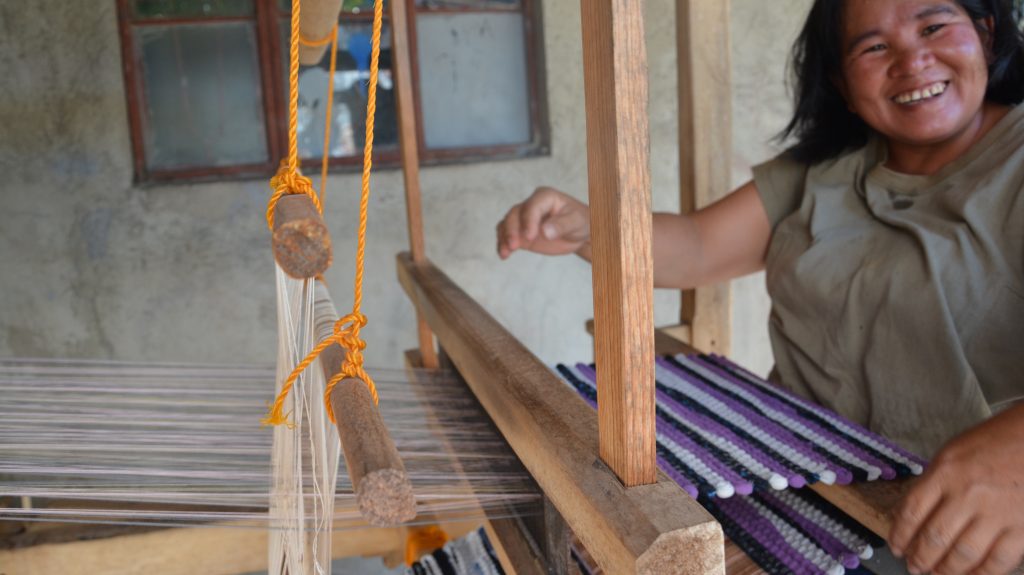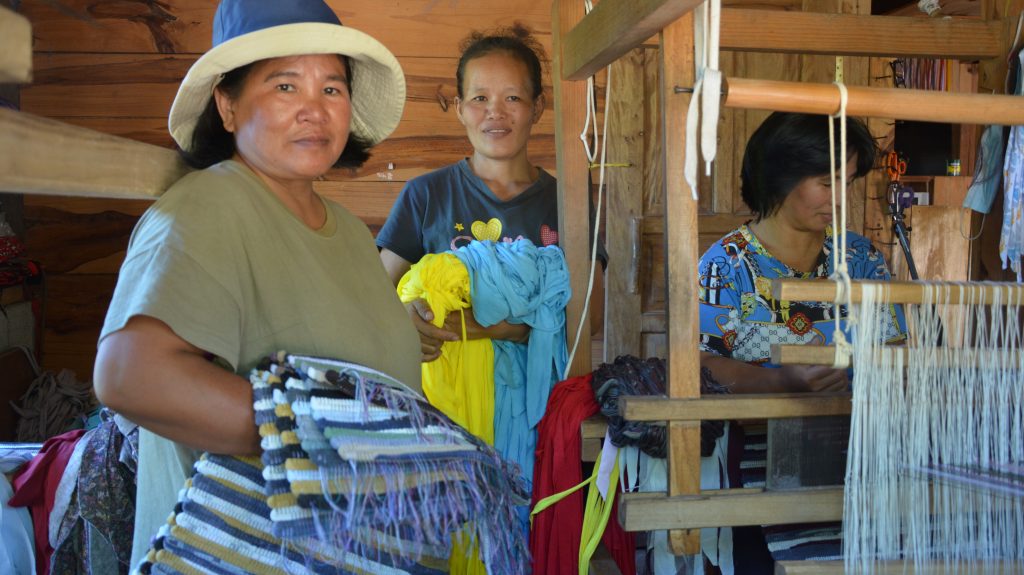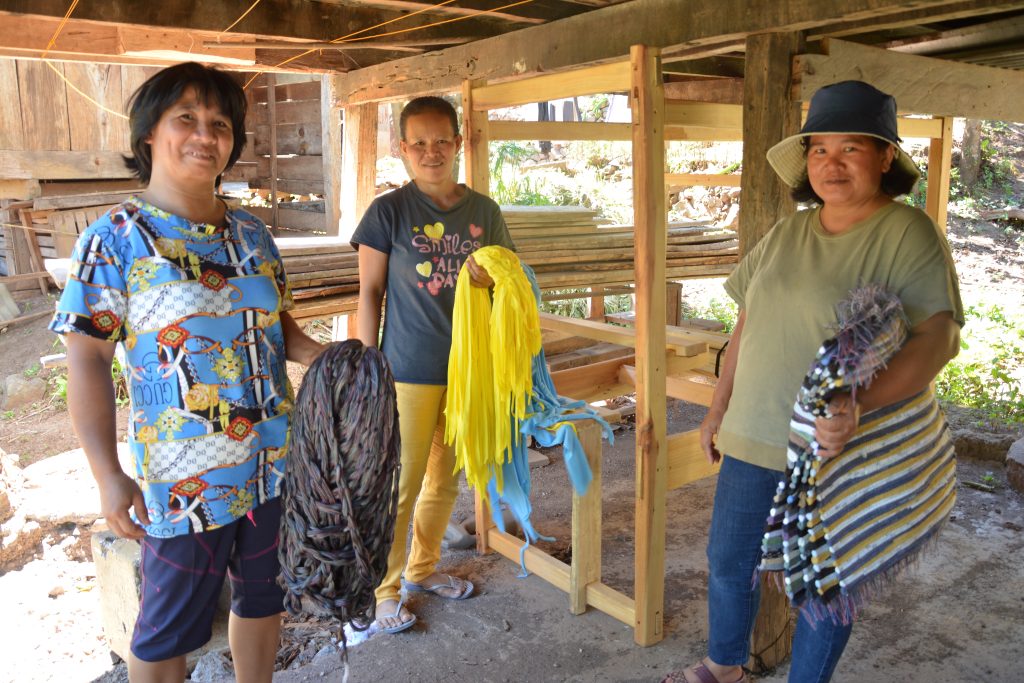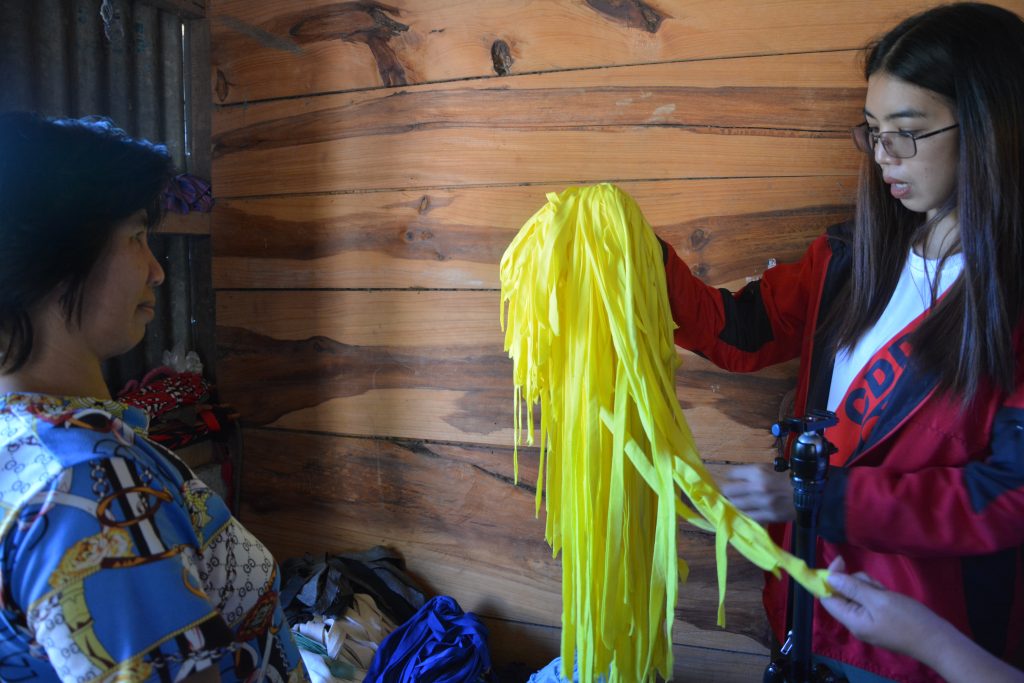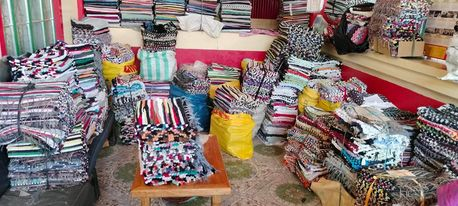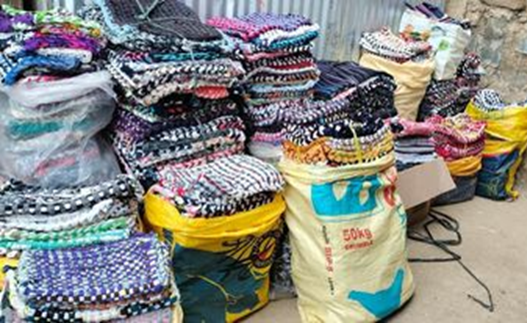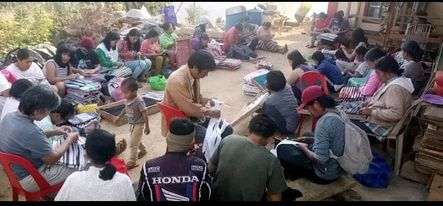
Environment protection, indigenous knowledge and skills promotion, community-engaged innovation, and proper resource management− These advocacy/practices were furthered through the implementation of Risk Resiliency Program- Climate Change Adaptation and Mitigation Disaster Risk Reduction (RRP-CCAM-DRR) which lead to sustenance of the weaving livelihood for the Program beneficiaries in the Municipality of Besao, Mountain Province.
The Department of Social Welfare and Development Field Office Cordillera Administrative Region (DSWD FO CAR) through Cash-For-Work Modality provided labor-cost amounting to more than 1.9 million pesos which employed 478 individuals from eight (8) barangays or 10-days. The beneficiaries were paid ₱400 each day to produce 60 rags/day. More than 29,000 of foot rags were produced and these were then sold by the beneficiaries. Their earnings were used as capital to continue with the foot-rag making livelihood.
Environmental protection prioritized; up-cycling pushed
One of the RRP-CCAM-DRR objectives is to increase the adaptive capacities of communities vulnerable to hazards brought by climate change.
According to CCAM Focal Emmy Kaslangen, waste management is a critical facet of environmental stewardship and public health. Efficient waste management involves not only the organized handling municipal waste but also emphasizes the principles of waste reduction, reuse, recycling, and/or up-cycling.
Up-cycling is the process of transforming discarded trash into a product with a higher value compared to its original form. “It is an effective tool in establishing a sustainable livelihood,” said the Mountain Province Environment and Natural Resources Officer (MPENRO).
Weaving stronger community ties
In Besao, up-cycling of used clothes has been observed since they re-purpose “yagyag” the local term for waste clothes into usable and sellable footrags. The “yagyag”once cut into strips becomes the raw material for footrags production; it is collected locally but the bigger volume is sourced out from Baguio City which are the unsellable ‘wagwag’ clothes.
In addition, weaving is an old industry in Mountain Province and is one of the traditional source of livelihood in Besao. According to Mr. Ceasar Pagosto, then Punong Barangay of Laylaya, weaving existed before him and blankets were the most common product but now women resort to footrags making.
“We [women] here are mostly engaged in weaving footrags. With it, we help minimize the textile wastes considering that burning of wastes are now prohibited and clothes takes time to decompose,” expressed Lisa Songaben, a beneficiary of CCAM CFW in Laylaya, Besao.
The project implementer saw an opportunity on this community-engaged innovation and existing indigenous skill and knowledge of the community people to further the advocacy on CCAM particularly on sustainable waste management. The DSWD Field Office CAR through its Disaster Response Management Division (DRMD) together with Provincial Local Government Unit (PLGU) of Mountain Province proposed and implemented the Footrags Production Activity thus addressing the waste problem and promoting the weaving industry in the Municipality.
The partner-beneficiaries from eight (8) barangays participated in the training/ workshop to share their knowledge since not all of the identified beneficiaries are knowledgeable with the weaving processes.
Two weaving technologies were employed; one is using warping frame board which is more handy. The other is “Tinal” a wooden machine that locals may modify to weave blankets; usually.
With determination and commitment at work, the beneficiaries in the barangays of Agawa, Catengan, Gueday, Lacmaan, Laylaya, and Tamboan produced more than the target footrags way more than the initial target.
Sustainable livelihood for one and for all
The engagement of the local residents in supporting the local enterprises, somehow stimulated economic growth within the community as it created other job opportunities for other members of the community.
Weavers in the community increased. “Due to the CCAM-CFW, others were encouraged to weave,” commented Tongkik Pasingan, also a beneficiary.
Besides the direct beneficiaries, other members of the community also benefited from the Project. Firstly, fabricators of wooden warping frame and the ‘Tinal’ benefited from the Foot Rags Production since the weavers used their earning from the 10-day CFW to purchase ‘Tinal’.
“The CCAM Cash-for-Work has provided us another opportunity to increase our household income. I used the PhP 4,000 to buy raw materials to weave. Also, my husband had additional income since more weavers ordered tinal,” thanked Rosenia Simon, also a beneficiary in Laylaya, Besao.
Secondly, the suppliers of ‘yagyag’ also gained since the weavers bought more raw materials to be able to increase their production.
Thirdly, “The out-of-school youth and school-going children also earned from assisting the weavers to cut ‘yagyag’ in exchange for minimal pay if not helping out their parents,” added Mrs. Simon.
Lastly, active associations in the barangays were able to continue this income generating livelihood by promoting them online and market establishment. They consistently became a direct supplier to buyers around Besao and other municipalities. Other locals market the finished products in the local markets in the Province but most are shipped to foot rags suppliers in Baguio City. These exemplifies the supportive environment needed for local livelihood projects to thrive.
In the pursuit of sustainable and eco-friendly practices up-cycling and rags production emerges as a creative and impact solution proven effective in Besao, Mountain Province.
As they, implement rags production, the community take a step towards a more resilient and mindful approach to resource utilization. By recognizing the value in what was once considered waste, they contribute to a future where sustainability and innovation coexist, weaving a fabric of change for a healthier environment in the Municipality of Besao. # DSWD FIELD OFFICE CAR, SOCIAL MARKETING UNIT, IO II MYLYN M. BONGSIAN and PDO II EMMY KASLANGEN



